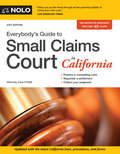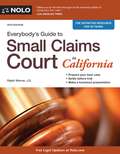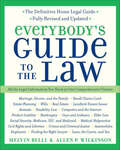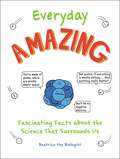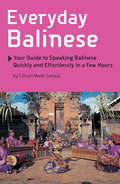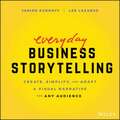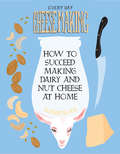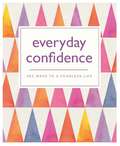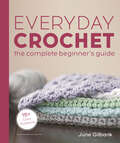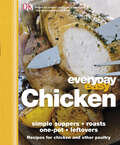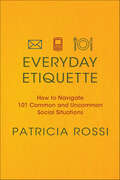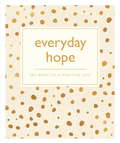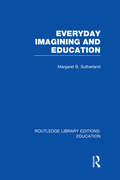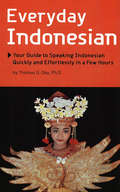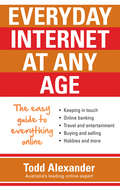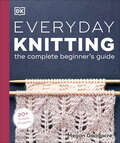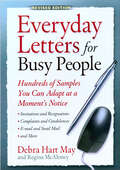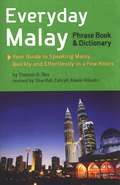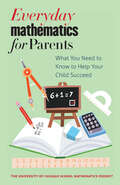- Table View
- List View
Everybody's Guide to Small Claims Court in California
by Cara O'NeillEverything you need to win your small claims case in California Smart preparation for your day in small claims court can make the difference between receiving a check for thousands of dollars and writing one. If you’re getting ready to appear before a judge, turn to Everybody’s Guide to Small Claims Court in California. It’s packed with everything you need to know to bring your case—or defend yourself if you’re sued—and win! Find out how to: write a demand letter determine your losses (damages) mediate a settlement file and serve papers gather evidence write your demand letter line up convincing witnesses present your case in court collect money when you win, and understand the appeal process. This edition is updated with the latest California laws and court procedures—features the insights of former judges who presided in small claims cases and advice on completing more than a dozen different court forms.
Everybody's Guide to Small Claims Court in California
by Ralph WarnerEvaluate your claim, figure out your best course of action and represent yourself in small claims court with this definitive guide Everybody's Guide to Small Claims Court in California gives you step-by-step instructions to bring or defend your case. From preparing evidence and lining up persuasive witnesses, to making a presentation in court and collecting the money you're awarded, this plain English book leads you through the entire process of going to court without a lawyer. Plus, it's the only book around that helps you factor in out-of-court issues, such as personal relationships, to help you determine whether going to court is worth the potential for recovery. Everybody's Guide to Small Claims Court in California shows you how to: evaluate whether you have a winning case mediate a settlement determine how much to sue for write your demand letter file and serve papers prepare evidence and witnesses for court plan a winning courtroom strategy convince the judge that you are right collect your money when you win This edition is updated with the latest rules and statutes for California's small claims courts, including instructions for accessing local courts and finding out their procedures.
Everybody's Guide to the Law: All The Legal Information You Need in One Comprehensive Volume
by Melvin M. Belli Allen Wilkinson“[A] comprehensive and well-organized directory to areas of law that affect the average person’s everyday life.”—BooklistWhat are your rights if the car you bought is useless? If your ex-boss refuses to let you take along your Rolodex? Who gets custody of the children after a divorce? Do you worry about laws governing your use of the Internet? What rights are accorded to the elderly, disabled, and other social minorities? How can you successfully sue in small claims court? Or write your own will?The law pervades every individual's life, yet few know just what their rights are, how to use them, and what to do when they're violated. With expert assistance from Everybody's Guide to the Law, all your legal questions and concerns will be answered in simple everyday language that demystifies the law and arms you with the right information to make the best decisions.While a host of Web sites and books claim to help you understand the law, this fully revised and updated edition of the essential home legal reference is your one-stop guide. Comprehensive, accurate, and with no hidden gimmicks or programs to sell you (unlike most online "resources"), this superbly readable, indispensable addition to any home library provides up-to-date and easy-to-understand practical legal information most people need to know.Praised by critics and embraced by the public, Everybody's Guide to the Law remains the standard by which all other home legal guides aspire to, but have never managed to meet.
Everyday Amazing: Fascinating Facts about the Science That Surrounds Us
by Beatrice the BiologistLike fan mail addressed to the natural world, Everyday Amazing is filled with uplifting and interesting musings on science from Beatrice the Biologist. Beatrice the Biologist is an easily amused former high school biology teacher with a soft spot for the mind-blowing science we encounter daily that we often take for granted. In Everyday Amazing, she shines the spotlight on ten different types of amazing everyday scientific facts in short chapters full of fun and fascinating tidbits bound to both entertain you and expand your horizons! Learn the basics of atomic science, sound waves, bioscience, microbiology, and more in accessible chapters offering a fresh perspective on concepts you may have learned about, but aren’t totally clear on. Quirky illustrations throughout add to the fun! Fall in love with science with Beatrice the Biologist in Everyday Amazing!
Everyday Balinese
by I Gusti SutjajaThis is a concise and user-friendly guide to learning basic BalineseEveryday Balinese is targeted to anyone who wishes to learn to speak colloquial Balinese. There are 23 lessons in the book, each with a dialogue that centers around the Balinese daily life. The dialogue is presented twice: The first version representing the lumrah or common Balinese; the second the alus or refined Balinese. Both versions are exactly the same grammatically; the difference lies in the word choice. Lumrah or common words are used by participants of equal social status in a conversation, and it reflects intimacy and informality among the users. Alus or refined words are associated with distancing and formality among users in a conversation.Each lesson contains a section on the grammar an word function, as well as a list of words in both the lumrah and alus forms, followed by their Indonesian and English equivalents. Each lesson ends with a section on sentence construction-how to use the structures taught to make simple sentences.The book has a pronunciation guide at the front, and a section or greeting, ordinal numbers and a handy dictionary at the end. The dictionary is arranged alphabetically by Balinese, followed by Indonesian and English equivalents.
Everyday Balinese
by I Gusti SutjajaThis is a concise and user-friendly guide to learning basic BalineseEveryday Balinese is targeted to anyone who wishes to learn to speak colloquial Balinese. There are 23 lessons in the book, each with a dialogue that centers around the Balinese daily life. The dialogue is presented twice: The first version representing the lumrah or common Balinese; the second the alus or refined Balinese. Both versions are exactly the same grammatically; the difference lies in the word choice. Lumrah or common words are used by participants of equal social status in a conversation, and it reflects intimacy and informality among the users. Alus or refined words are associated with distancing and formality among users in a conversation.Each lesson contains a section on the grammar an word function, as well as a list of words in both the lumrah and alus forms, followed by their Indonesian and English equivalents. Each lesson ends with a section on sentence construction-how to use the structures taught to make simple sentences.The book has a pronunciation guide at the front, and a section or greeting, ordinal numbers and a handy dictionary at the end. The dictionary is arranged alphabetically by Balinese, followed by Indonesian and English equivalents.
Everyday Business Storytelling: Create, Simplify, and Adapt a Visual Narrative for any Audience
by Janine Kurnoff Lee LazarusA practical, easy-to-use guide to transform business communications into memorable narratives that drive conversations—and your career—forward <p><p> In Everyday Business Storytelling: Create, Simplify, and Adapt A Visual Narrative for Any Audience, visual communication and storytelling experts Janine Kurnoff and Lee Lazarus leverage decades of experience helping executives at the world's top brands—including Facebook, Nestle, Accenture, and Marriot—bring clarity and meaning to their business communications. Whether you're building a presentation, crafting a high-stakes email, or need to influence decisions in your next meeting with an executive, Everyday Business Storytelling offers an insightful exploration of how to develop compelling business narratives. <p><p> You'll discover how to use a simple, repeatable framework to choreograph your ideas, data, and insights into an authentic, persuasive story. Within this business book, you'll also find clever data visualization and visual display techniques to help humanize your stories and build an emotional connection with your audience, leading to improved presentation skills and effective data storytelling. <p><p> Just a few of the things you'll learn from this business book include: <p><p> • The science behind why storytelling is the most effective way to trigger emotion in an audience and how to craft a business narrative that makes your ideas engaging. <p>• The four signposts of storytelling and how to identify and weave in your BIG idea to capture attention. <p>• How to craft expert headlines that guide your audience and advance your story. <p>• Everyday Business Storytelling is an indispensable guide to making your communications stick in the minds of your audience and drive change. If you're a busy, talented businessperson responsible for executive presentations, one-pagers, emails, or virtual meetings, this communication book is for you.
Everyday Cheesemaking: How to Succeed Making Dairy and Nut Cheese at Home (Diy Ser.)
by K Ruby BlumeEveryday Cheesemaking is an introduction to DIY home cheese making made simple and accessible. K. Ruby Blume introduces you to the concepts, equipment, and ingredients necessary to making cheese at home successfully the very first time you try. The book offers clear instructions, humorous stories, and dozens of recipes and troubleshooting tips. You'll learn about running a small home goat dairy and how to make non-dairy cheese recipes using nut milks. With its light and practical approach, this book is perfect for anyone who is itching to get started and impress their friends and family with delicious homemade cheese.
Everyday Confidence: 365 ways to a fearless life
by PyramidFilled with positive affirmations from a host of inspiring people, as well as easy-to-action suggestions for building up your sense of self-worth, Everyday Confidence will inspire and encourage you to stand up for yourself. With daily tips and brave actions for boosting your courage, this book helps you to take small, significant steps to an assertive and truly confident you.About the Everyday seriesGet to grips with a single subject in small, manageable steps with the Everyday series. From inspirational quotes to professional tips, the short daily entries fit perfectly into the hustle and bustle of everyday life. These small, chunky books are a perfect gift as well as a great self-purchase.
Everyday Confidence: 365 ways to a fearless life (365 Ways to Everyday...)
by Everyday ConfidenceFilled with positive affirmations from a host of inspiring people, as well as easy-to-action suggestions for building up your sense of self-worth, Everyday Confidence will inspire and encourage you to stand up for yourself. With daily tips and brave actions for boosting your courage, this book helps you to take small, significant steps to an assertive and truly confident you.About the Everyday seriesGet to grips with a single subject in small, manageable steps with the Everyday series. From inspirational quotes to professional tips, the short daily entries fit perfectly into the hustle and bustle of everyday life. These small, chunky books are a perfect gift as well as a great self-purchase.
Everyday Crochet: 15+ Cozy Patterns
by June GilbankLearning crochet has never been easier!You&’ve seen gorgeous crochet items online and in boutique shops, and you&’d love to learn to create them yourself. Now&’s your chance! Packed with hundreds of inspirational color photos and easy-to-follow instructions, this fun guide teaches you how to hook your way to a wonderful new skill. This revised edition includes:Expert advice on choosing your hook, yarn, and other helpful toolsStitch-by-stitch lessons for dozens of pretty and practical stitchesIllustrated instructions for shaping your work with increases and decreasesGuidance on reading crochet patterns and decoding crochet chartsTroubleshooting tips for avoiding common crochet mistakesMore than 15 stylish projects and patterns that build on what you&’ve learned
Everyday Easy Chicken: Simple Suppers, Roasts, One-Pot, Leftovers; Recipes for Chicken and Other Poultr
by DKThis wonderfully illustrated, delicious guide is the single-ingredient resource for each and every chicken lover. Easy to navigate, the six "recipe choosers" at the start of the book act as an instant reference for cooks in a hurry. A useful techniques section covers all the preparation methods you may need step-by-step. Become an expert poultry chef in record time with this complete, comprehensive cooking manual. Recipes aren&’t all this book has to offer. Everyday Easy Chicken is jam-packed with all the information busy home cooks need to know. Easily-recognizable icons with each recipe indicate serving proportions, preparation time, cooking time, and nutritional information for cooks looking to prepare low-fat and GI meals. This guide also details what special equipment may be required for each recipe and even offers tips on storing and freezability. Other handy extras include information on how to plan ahead for your meal, and expert tips on what to pair with your favorite poultry. Even if you don't have chicken all that often, Everyday Easy Chicken's easy, delicious results will make you wish you did!
Everyday Etiquette: How to Navigate 101 Common and Uncommon Social Situations
by Patricia RossiThe secret to self-confidence is to know and understand the rules of social engagement before you're in the middle of an uncomfortable situation.Do you know how to:Pick the right fork? Shine at a networking event? Write a Thank you Note? Shake hands? RSVP to an invitation? Say no to a request for a favor?Use social media with clarity?Behave at a sporting event?Say the perfect thing at a funeral?Smoke a cigar in public? Etiquette isn't just something you need on formal occasions. It's a blueprint for how to behave every day, in every situation, to make interactions between people smooth and pleasant, with no ruffled feathers, misunderstandings or hurt feelings. It helps you smoothly transition from college to corporate life, and from professional obligations to personal ones. Etiquette doesn't exist to add a layer of extra rules to life—it's there to guide us to treat each other with kindness and consideration in our personal and professional lives.
Everyday Hope: 365 Ways to a Tranquil Life (365 Ways to Everyday...)
by Everyday HopeEveryone has goals and dreams, or decisions and dilemmas they need a bit of hope for. With a tip, exercise or inspirational quote for each day of the year, Everyday Hope is the little book that will encourage to you open up, dare to dream and find your way to a more positive and hopeful life.About the Everyday series Get to grips with a single subject in small, manageable steps with the Everyday series. From inspirational quotes to professional tips, the short daily entries fit perfectly into the hustle and bustle of everyday life.
Everyday Imagining and Education (Routledge Library Editions: Education)
by Margaret SutherlandThis book discusses the kind of imaginative thinking which is going on all the time without producing the masterpieces of art and culture. The author brings together the body of educational theory, psychological theory and some general opinions about imagination, to provide an account of everyday imagining for educationalists, psychologists, teachers and parents.
Everyday Indonesian
by Thomas G. OeyThis is a travel sized and easy-to-use Indonesian phrasebook, dictionary, and beginning Indonesian language bookThe lessons in this book are prioritized, with more important words and phrases being give first, so that you may profit no matter how deeply into the book you go. By studying the first section only, you acquire a basic "survival" Indonesian, and by mastering the first three sections you should be able to get around quite well on your own. In order to present each lesson clearly as a unit and reinforce learning, Indonesian vocabulary is often repeated. Colloquial Indonesian, which is the most commonly spoken and the most readily understood form of the language is used. By repetition and memorization of the materials, you will quickly gain a grasp of the language's basic elements. Everyday Indonesian includes:Over 2,000 of the most commonly used Indonesian words and phrasesA useful and concise Indonesian dictionaryExtensive notes on grammar and the Indonesian langaugeCultural dos and dont's that will make your visit go smoothlyKnowing a few simple phrases of Indonesian opens up an entirely new and more fulfilling travel experience.
Everyday Internet at Any Age: The Easy Guide to Everything Online
by Todd AlexanderPeople aged 55 and up, who don?t use the Internet each day in their work, often find it daunting to search for the information on the net, and often don?t even know where to begin. While Baby Boomers represent the fastest growing group of Internet adopters, little information is available to help them cut through the billions of websites to find those sites most applicable to their age group. This book has been written to empower these people. It offers information and advice from some of Australian?s most experienced eCommerce professionals, and covers the main types of internet use. Written in simple language, EVERYDAY INTERNET will unlock the Internet for everyone.
Everyday Knitting
by Megan GoodacreLearn how to knit with simple, easy-to-follow guides and over 20 cute and cozy project patterns!Interested in knitting but unsure where to start? Everyday Knitting offers simple, step-by-step tutorials geared toward beginning knitters. Master the basics of knitting and improve your technique with clear, comprehensive instructions for casting on, binding off, knit and purl stitches, and more. Once you&’ve mastered the basics, move on to fun and functional practice projects to hone your skills.From selecting the right yarn to choosing the tools you need to get started, Everyday Knitting covers everything you need to know to make lace bookmarks, scarves, fingerless mitts, and even friendly knitted critters. Features include:Clear, step-by-step instructions to build confidence in beginning knittersOver 20 practice projects to help you hone your skills and create fun, usable itemsHandy instructional guides to teach you how to decipher a chart, read a pattern, increase and decrease rows, purchase yarn for your project, and moreStitch galleries to provide inspiration with nearly two dozen stitch patterns including a variety of cable and lace stitches
Everyday Letters for Busy People: Hundreds Of Samples You Can Adapt At A Moment's Notice
by Debra Hart May Regina McAloneyNow revised and updated: Hundreds of tips, techniques, and samples to help you write the perfect letter (or e-mail) no matter what the occasion.A text message may be fast—but sometimes only a letter will do. Writing a good letter takes time and thought, but there are ways to make the process faster, easier, and more effective.With Everyday Letters for Busy People as your guide, you can write the kind of letters that get action, build relationships, ease tense situations, and get your message across. Everyday Letters for Busy People includes a wide variety of sample letters you can use or adapt at a minute’s notice including:Business letters • Complaint letters • Community action letters • Job-search letters • Letters to government officials and agencies • Thank-you letters • Invitations • Condolences • Resignations and many moreWith a new section on how to write concise, polite, and effective e-mails, Everyday Letters for Busy People will not only help you compose the sharpest interview follow-up, the kindest thank you, the most heartfelt condolence, and the most effective complaint letter, it will also direct you in proper letter etiquette and help you become a better writer.
Everyday Malay
by Thomas G. Oey Sharifah Zahrah Alwee AlkadriThis is a travel sized and easy-to-use Malay phrasebook, dictionary, and beginning Malay language bookBahasa Malaysia (literally "the Malaysian langauge") is based on Malay which is the mother tongue of the Malays of the Peninsula and the people of central eastern Sumatra. Malay has been the lingua franca of Southeast Asia for centuries. The lessons in this book are prioritized, with more important words and phrases being give first, so that you may profit no matter how deeply into the book you go. By studying the first section only, you acquire a basic "survival" Bahasa Malaysia, and by mastering the first three sections you should be able to get around quite well on your own. Everyday Malay includes:Over 2,000 of the most commonly used Malaysian words and phrasesA useful and concise Malay dictionaryExtensive notes on grammar and the Malay langaugeCultural dos and dont's that will make your visit go smoothlyKnowing a few simple phrases of Malay opens up an entirely new and more fulfilling travel experience. Malaysians love it if you can communicate in their language, and in only a few short hours this book allows you to do just that!
Everyday Mathematics for Parents: What You Need to Know to Help Your Child Succeed
by The University of Chicago School Mathematics ProjectThe Everyday Mathematics (EM) program was developed by the University of Chicago School Mathematics Project (UCSMP) and is now used in more than 185,000 classrooms by almost three million students. Its research-based learning delivers the kinds of results that all school districts aspire to. Yet despite that tremendous success, EMoften leaves parents perplexed. Learning is accomplished not through rote memorization, but by actually engaging in real-life math tasks. The curriculum isn’t linear, but rather spirals back and forth, weaving concepts in and out of lessons that build overall understanding and long-term retention. It’s no wonder that many parents have difficulty navigating this innovative mathematical and pedagogic terrain. Now help is here. Inspired by UCSMP’s firsthand experiences with parents and teachers, Everyday Mathematics for Parents will equip parents with an understanding of EM and enable them to help their children with homework—the heart of the great parental adventure of ensuring that children become mathematically proficient. Featuring accessible explanations of the research-based philosophy and design of the program, and insights into the strengths of EM, this little book provides the big-picture information that parents need. Clear descriptions of how and why this approach is different are paired with illustrative tables that underscore the unique attributes of EM. Detailed guidance for assisting students with homework includes explanations of the key EM concepts that underlie each assignment. Resources for helping students practice math more at home also provide an understanding of the long-term utility of EM. Easy to use, yet jam-packed with knowledge and helpful tips, Everyday Mathematics for Parents will become a pocket mentor to parents and teachers new to EM who are ready to step up and help children succeed. With this book in hand, you’ll finally understand that while this may not be the way that you learned math, it’s actually much better.
Everyday Mathematics: Student Reference Book
by The University of Chicago School Mathematics ProjectA reference book is organized to help people find information quickly and easily. Dictionaries, encyclopedias, atlases, cookbooks, even telephone books are examples of reference books. Unlike novels and biographies, which are usually read in sequence from beginning to end, reference books are read in small segments to find specific information at the time it is needed. You can use this Student Reference Book to look up and review information on topics in mathematics. It is not always easy to read text about mathematics, but the more you use the Student Reference Book, the better you will become at understanding this kind of material. You may find that your skills as an independent problem-solver are improving. We are confident that these skills will serve you well as you undertake more advanced mathematics courses.
Everyday Mathematics: Student Reference Book
by The University of Chicago School Mathematics ProjectStudents can use this Student Reference Book to look up and review information on topics in mathematics. It consists of the following sections: Table of contents, Essays on mathematical topics, Descriptions of how to use a calculator, Directions on how to play some of the mathematical games, Glossary of mathematical terms, Tables and charts, Answer key, Index, etc.
Everyday Positivity: 365 Ways to a Content Life
by PyramidPositivity isn't something you are - it's something you do. It's not just a trait that people have naturally, but an active decision to seize the day and look for opportunity in the mundane. Including quotes and affirmations from inspiring individuals, as well as useful tips for boosting your mood, Everyday Positivity is the essential guide to helping you achieve daily optimism. Keep this little book close by for the perfect reminder to always look on the bright side.About the Everyday seriesGet to grips with a single subject in small, manageable steps with the Everyday series. From inspirational quotes to professional tips, the short daily entries fit perfectly into the hustle and bustle of everyday life.
Everyday Positivity: 365 Ways to a Content Life (365 Ways to Everyday...)
by Everyday PositivityPositivity isn't something you are - it's something you do. It's not just a trait that people have naturally, but an active decision to seize the day and look for opportunity in the mundane. Including quotes and affirmations from inspiring individuals, as well as useful tips for boosting your mood, Everyday Positivity is the essential guide to helping you achieve daily optimism. Keep this little book close by for the perfect reminder to always look on the bright side.About the Everyday seriesGet to grips with a single subject in small, manageable steps with the Everyday series. From inspirational quotes to professional tips, the short daily entries fit perfectly into the hustle and bustle of everyday life.
